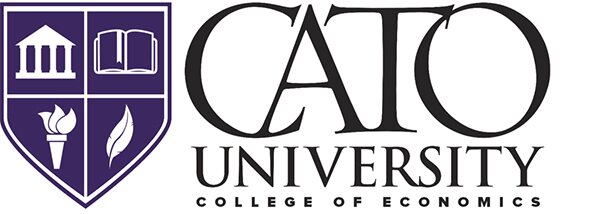October 25-27, 2018
Omni Parker House • 60 School St, Boston, MA
About Cato University | Schedule | Register | Scholarship | Readings
Cato University’s College of Economics is based on the conviction that economics is a way of thinking, a tool for decision-making, and a basis for action. It’s the necessary foundation for understanding government, business, and society. Discussions from top economics scholars are designed to solidify your expertise on basic economic principles, and then help you apply those tools to today’s most pressing issues.
Schedule
| Thursday, October 25 | |
| 3:00 – 6:00PM | Registration |
| 6:30 – 7:30PM | Reception |
| 7:30 – 9:30PM | The Economics of Liberty and Prosperity Modern widespread prosperity is made possible by respect for individual freedom – to think, to plan, to challenge old ways of doing things, to introduce new products and services, to be enterprising. How are liberty and shared prosperity closely connected? Dinner Speaker: Tom G. Palmer, Senior Fellow, Cato Institute, and Director of Cato University Download Podcast of Event |
| 9:30 – 10:00PM | Bastiat Scholarship Student Meeting |
| 9:30 – 11:00PM | After Dinner Discussion |
|
Friday, October 26 |
|
| 8:00 – 9:00AM | Breakfast |
| 9:00 – 10:15AM | The Power of Incentives What is the impact of positive incentives? Free societies rely on the right incentives to foster peaceful cooperation and harmony. How can the wrong incentives, even imposed with the best of intentions, create truly perverse consequences? Speaker: Jeff Miron, Director of Economic Studies, Cato Institute Download Podcast of Event |
| 10:15 – 10:45AM | Break |
| 10:45 – 12:00PM | Spontaneous Orders Most of the order in human life wasn’t consciously foreseen, designed, or imposed; it just grew. Free societies include many islands of conscious planning, but the overall order of a free society isn’t planned. Organizations have purposes, but society has no one purpose. Speaker: Lynne Kiesling, Visiting Associate Professor in Economics, Purdue University Download Podcast of Event |
| 12:00 – 1:30PM | Lunch |
| 1:30 – 2:45PM | The Economics of Cooperation and Coercion People can get what they want by persuasion or by violence. But, how does economics help us to understand each form of interaction: work and trade, on the one hand, and force and robbery, on the other? Speaker: Jeff Miron, Director of Economic Studies, Cato Institute Download Podcast of Event |
| 2:45 – 3:15PM | Break |
| 3:15 – 4:30PM | Making History Sing Economics: The Quickie Tour Speaker: Deirdre Nansen McCloskey, Distinguished Professor of Economics, History, English, and Communication, University of Illinois-Chicago Download Podcast of Event |
| 4:30PM | Free Time |
| 6:30 – 7:30PM | Reception |
| 7:30 – 9:30PM | Rational Choice and Public Policy Analysis Public choice has emerged to explain behavior in both markets and politics. To what extent do voters and consumers behave rationally, and how can a science largely germinated in the study of market exchange help to explain politics? Speaker: Tom G. Palmer, Senior Fellow, Cato Institute, and Director of Cato University Download Podcast of Event |
| 9:30 – 10:30PM | Bastiat Scholarship Student Meeting |
| 9:30 – 11:00PM | After Dinner Discussion |
|
Saturday, October 27 |
|
| 8:00 – 9:00AM | Breakfast |
| 9:00 – 10:15AM | Environmental Economics How can property, contracts, markets, and legal accountability align incentives to create flourishing and clean environments, stewardship of resources, and social harmony? Speaker: Lynne Kiesling, Visiting Associate Professor in Economics, Purdue University Download Podcast of Event |
| 10:15 – 10:45AM | Break |
| 10:45 – 12:00PM | The Economics of Trade and the Politics of International Trade International trade accounting is often a source of confusion that can be clarified by systematically examining the terms involved. What are the political controls and the myths that concentrated interests use to restrict mutually beneficial exchange? Speaker: Daniel J. Ikenson, Director, Herbert A. Stiefel Center for Trade Policy Studies, Cato Institute Download Podcast of Event |
| 12:00 – 1:30PM | Lunch |
| 1:30 – 2:45PM | The Economic Analysis of Social Policy Economics doesn’t just illuminate and explain exchange of goods and services or voting behavior in political contests. How can it be used to explain other governmental policies and their consequences, from prohibition of drugs and alcohol to sexual behavior? Speaker: Jeff Miron, Direcrtor of Economic Studies, Cato Institute Download Podcast of Event |
| 2:45 – 3:15PM | Break |
| 3:15 – 4:30PM | The Economics of Knowledge The knowledge needed for economic coordination is dispersed throughout society and not easily communicated. How have markets, prices, and other mechanisms evolved to allow people in free societies to benefit from such dispersed knowledge without having to centralize and master it all themselves? Speaker: Lynne Kiesling, Visiting Associate Professor in Economics, Purdue University Download Podcast of Event |
| 4:30PM | Free Time |
| 6:30 – 8:30PM | How Nations Succeed: The History and the Future Dinner Speaker: Deirdre Nansen McCloskey, Distinguished Professor of Economics, History, English, and Communication, University of Illinois-Chicago Download Podcast of Event |
